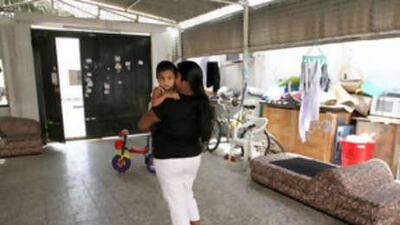DUBAI // As the deadline to end villa sharing in Dubai passed this weekend, many families defiantly remained in their homes as they awaited final eviction notices. Others, whose water and electricity were cut off, chose to separate temporarily as husbands, unable to find alternative affordable accommodation, sent their wives and children back to their home countries. Dubai Municipality enacted the "one villa, one family" law earlier this year, claiming that sharing villas among families was unsafe and presented environmental and health risks. The deadline for ending the practice was Friday.
Only one family can now live in a villa, although immediate family members may share. Unrelated families still sharing villas in districts of Dubai such as Jumeirah, Um Suqeim, Al Barsha and The Springs face eviction. Omar Abdul Rahman, the head of buildings inspection for the municipality, said: "These homes are cheap because they are dangerous and a health hazard for families living in them. "They are partitioned using plywood and other dangerous materials like asbestos. We are more concerned about the safety of the people.
"We have been giving notices to the landlords but no one seems to take any notice. We were forced to take action." A Filipino electrical maintenance worker, who spoke on condition of anonymity, said he was forced to send his wife and youngest son back to the Philippines four weeks ago after power was cut off at the villa he still shares with other low-income families in Jumeirah. The shanty-like villa, where two families share each room, is one of many in Jumeirah 1, behind Jumeirah Beach Road and only minutes away from upscale villas lining the road.
"My wife and my seven-year-old son went back home," said the Filipino, 46, who has lived in Dubai for 14 years. "I took my son out of school and sent them back because these are not normal living conditions which they can endure and we could not afford to move. At first there was an erratic cut of electricity for a few hours a day but then a week ago it was completely cut. "Our landlord has given us a generator, but only for five hours a night."
He is still living in the villa with his 23-year-old son but said they would probably move out by the end of the month. "My next move is to a bed-spacing accommodation and then I will start working on finding a job in another Gulf country," he said. "There is no electricity and we can't cook or sleep properly. We sleep on and off every night." He said many people were now sleeping outdoors because the heat was unbearable in the villa.
"There are many families in here but I don't know how many. It is divided. Two families live in one room with a partition between them." Some families moved out because the Government deadline had passed, he said. "But the majority of people are still here. Most can't afford to move out." He said a Filipino television anchorman came to film the villa recently to show people the conditions in which he and his neighbours were sleeping.
He said the Government should have given low-income people alternatives before implementing the policy. "There should be an alternative given, like building low-cost accommodation for low-paid expats," he said. "But we have to find a way to survive and the living prices are simply unaffordable." The campaign to evict families sharing villas began earlier this year, when those sharing in al Rashidiya district were ordered to move out. Last month the municipality extended the campaign to other districts.
P Sadakaran, a machinist from India who lives in the same district as the Filipino, said he would have to send his family home when he was forced out of his villa because rents elsewhere were too high. He and his wife, a teacher, have a joint monthly income of Dh6,000 (US$1,635). They have a daughter, aged two and a half, and a three-month-old son. "We currently live in a small room in a villa. We pay Dh1,800 a month plus utilities, but having one family per villa is a huge problem because most of the people here cannot even dream about affording it," he said.
"If we move out to a flat, it will cost between Dh3,000 and Dh4,000. Since we both work we have a babysitter whom we pay Dh1,000. What will we be left with? We won't have enough to eat." Electricity and water are still supplied in the villa where his family and five other families live, but Mr Sadakaran said people in the neighbourhood were wondering what to do. "Everyone is talking about it, we all know what's coming. But most people are staying and we are staying, too, until the moment comes and we get evicted."
Mr Sadakaran, 37, who moved to Dubai in 1993, said the moment the electricity was cut would be the time for him and his family to go. "We hope the electricity won't get cut for as long as possible, but once it's cut then my wife and I have planned an emergency call to buy her and the kids a flight back and I will move into a camp," he said. Although he felt stressed and saddened to separate from his family, he accepted that this was his fate and he would have to visit his wife and children in India once a year. "It's the Government which makes the rules. You can't fight it and you just accept it," he said.
Inspections of villas are being carried out and authorities warn that any landlord found flouting the law could be fined as much as Dh50,000. Last year, municipality officers targeted bachelors living in villas. rabubaker@thenational.ae

